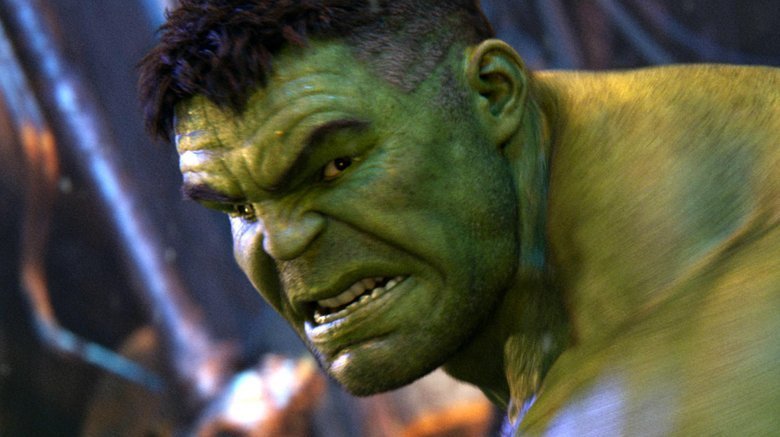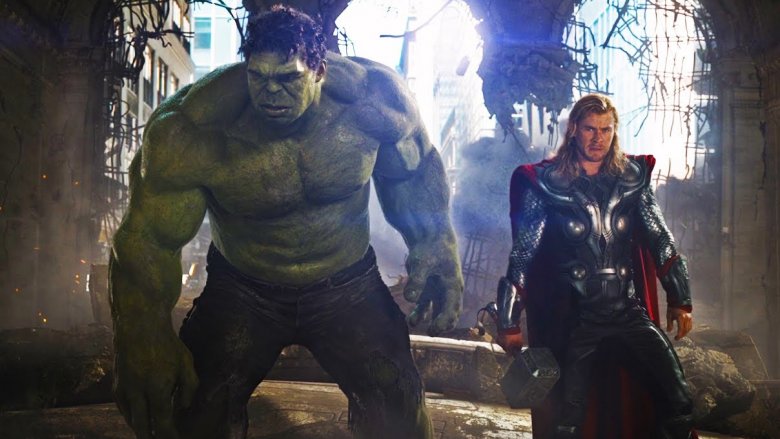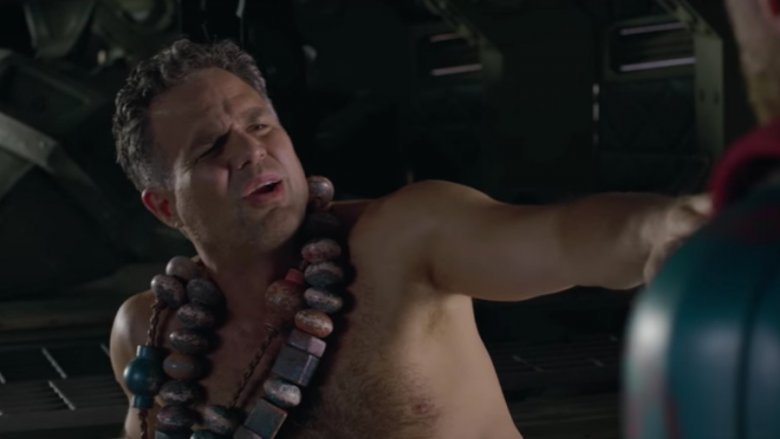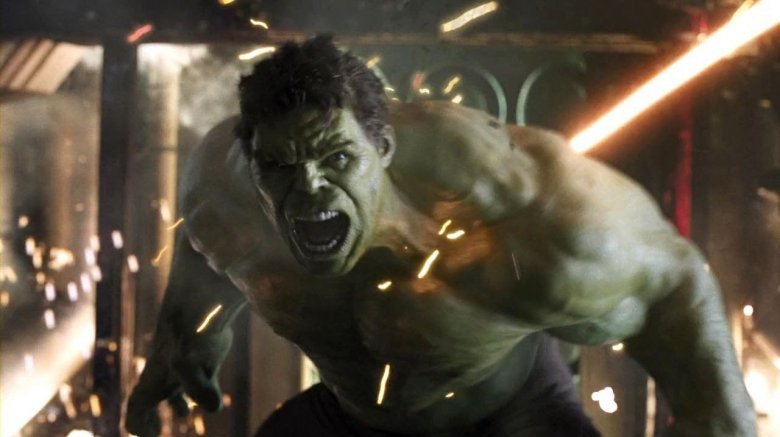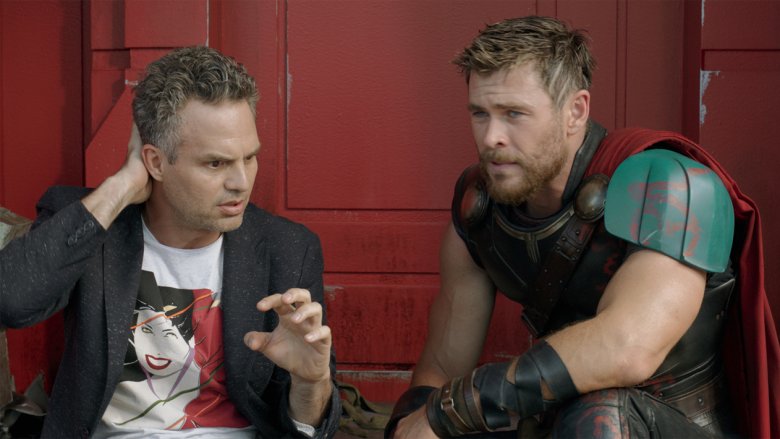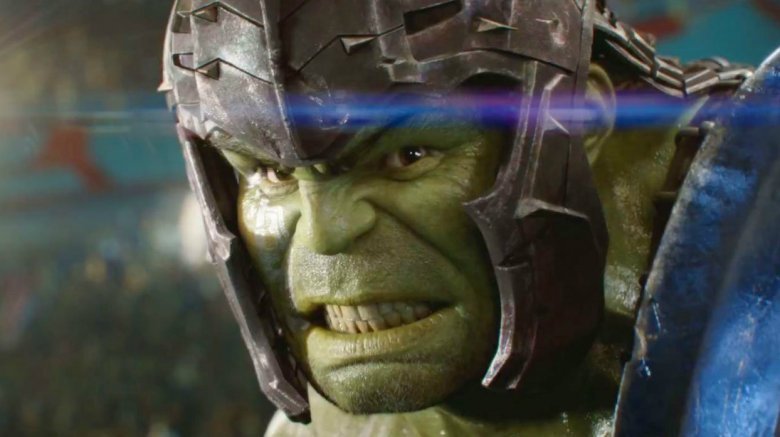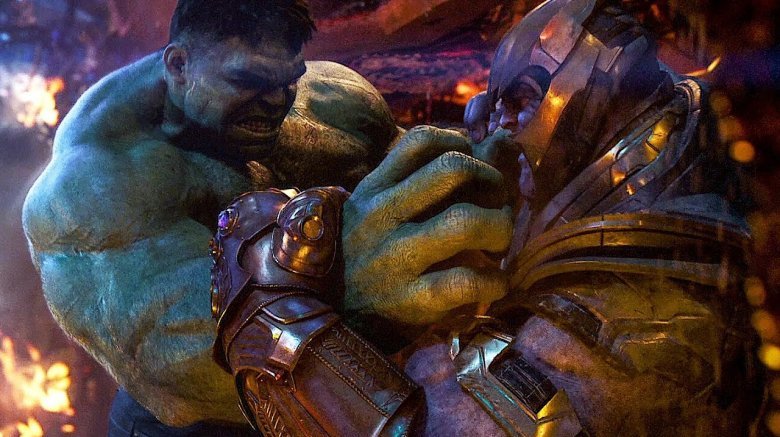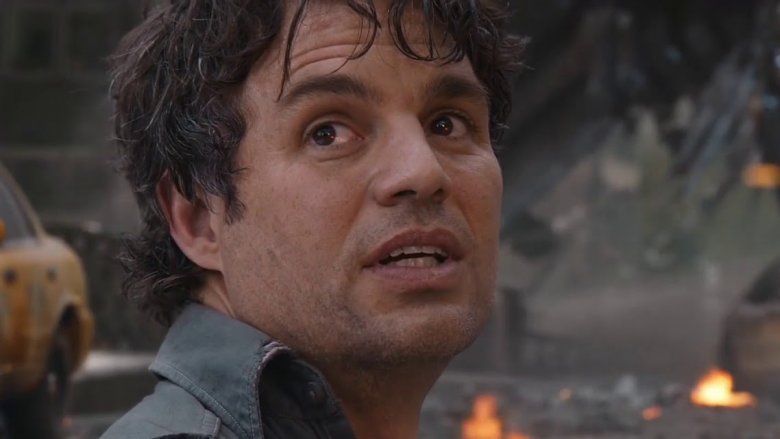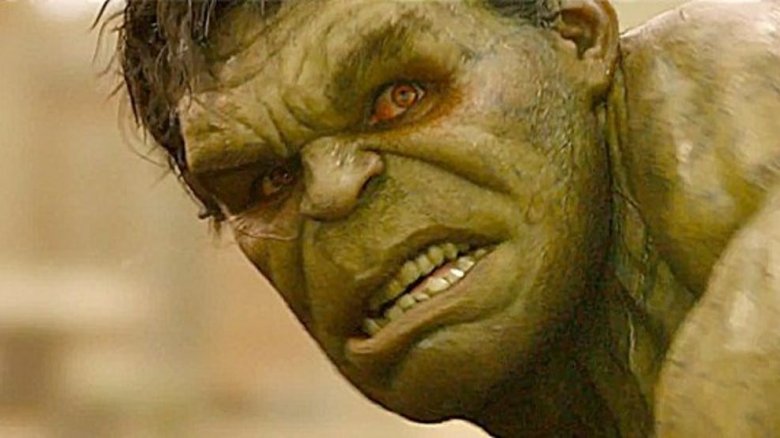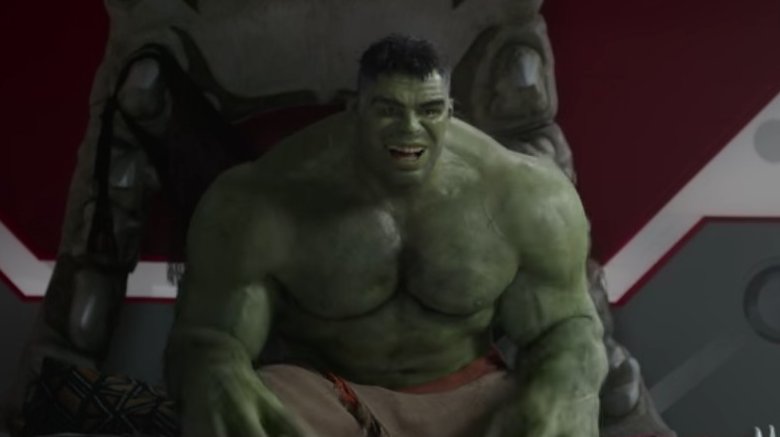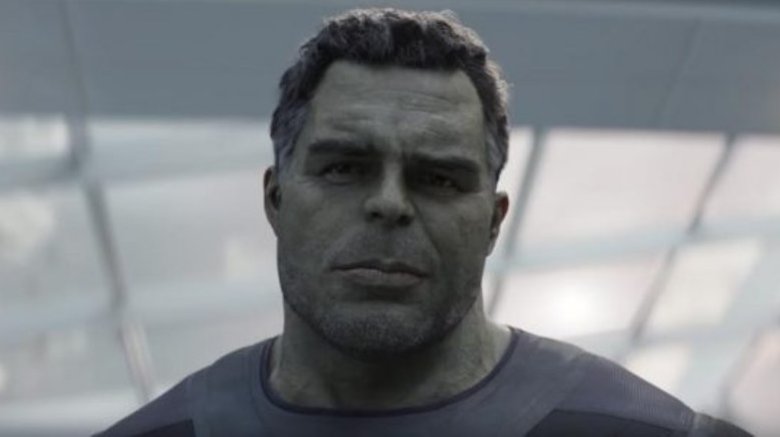The 5 Best And 5 Worst Things About The Hulk Of The MCU
If you're still trying to avoid Avengers: Endgame spoilers, stop reading now. It's time to take a close look at just where the Infinity Saga's finale has left Marvel's green giant.
It seems a relatively safe assumption that Hulk's (Mark Ruffalo) smashing days are over in the MCU. While he survived Avengers: Endgame and didn't wind up aged like Steve Rogers (Chris Evans), the Hulk was the only Avenger powerful enough to wield the Infinity Stones in Endgame and undo Thanos' Infinity War decimation. Hulk's right arm was horribly scarred by the feat, and at the end of the film the arm is still in a cast. Speaking with ComicBook.com, co-director Joe Russo confirmed the damage to Hulk's arm is permanent. "He's lost an arm... that's not coming back." Russo said. "It's irreversible."
So with what appears to be the Hulk's MCU sunset here, it's a good time to review Marvel's films and take a look at what was great about their depictions of the Green Goliath, and what wasn't so great. From breaking the traditional superhero mold to surviving a rare MCU re-cast to being besieged by complex movie rights issues, the Hulk has been unique in Marvel's movie pantheon. The situation has proven challenging for filmmakers, and at times frustrating to the hero's hardcore fans.
Taking all of that into account, here's what we think are the five best and five worst things about the Hulk of the MCU.
Best: Hulk truly smashes
Before the MCU, live-action adaptations of the Hulk universally disappointed in one sense: failing to reflect the Hulk's power. Ang Lee's Hulk featured a character who was fairly powerful, but there was so little action you barely got to see it. The Green Goliath of the '70s live-action Incredible Hulk and the late '80s TV movies wasn't even in the same ballpark. Even the early MCU version in 2008's Incredible Hulk paled in comparison to the comic book Hulk. We did not get to see the Hulk smash like he truly should smash until 2012's Avengers, and oh man, did he smash.
Hulk's epic thrashing of Loki (Tom Hiddleston), his sucker punching of Thor (Chris Hemsworth), and his takedown of one of the Chitauri Leviathans with a single punch were all hopeful signs that Hulk fans would finally see their hero on the big screen with the same ungodly power the comic book version has. Even when Iron Man (Robert Downey Jr.) defeats him in Age of Ultron with a sucker punch of his own, it isn't before the Hulk teaches Stark and all of Johannesburg how powerful he is. And regardless of Hulkbuster suits, the same flick sees the Hulk twice easily taking down the insane robot that's giving all the other Avengers so much trouble.
Worst: No home for Hulk
For a myriad of reasons, we didn't get to see another solo Hulk movie after 2008's Incredible Hulk. Fans of the character had to settle for Avengers flicks and his co-star spot in Thor: Ragnarok (unless you count the Iron Man 3 post-credits cameo, and you shouldn't). And hey, that's pretty good. A president of, say, the Moon Knight fan club might understandably tell a complaining Hulk fan to be grateful and stop whining.
The problem is that as a result of the character not getting his own solo vehicle, he's never the focus. In Ragnarok, the spotlight's mainly on Thor (which is fair, since his name is half of the movie's title). In the various Avengers entries he needs to share time with the rest of the team, and even when Hulk takes center stage, things are usually revolving around his relationships with them. In Avengers, a lot of his time is focused on his growing friendship with Stark and his questioning over whether he belongs with the team at all. In Age of Ultron, everything is about his unpopular relationship with Natasha (Scarlett Johansson). We barely see the "Other Guy" in Infinity War, and while he was an integral part of Endgame, so much was left unexplained and unanswered.
Just as David Banner (Bill Bixby) always found himself back on the road at the end of every episode of his Incredible Hulk show, the Hulk of the MCU never had a home, and it showed.
Best: He finally looks like the Hulk
Watch the behind-the-scenes features on the home releases for 2008's Incredible Hulk and 2003's Hulk, and you'll learn a lot about the technology used to make the CGI renderings of the Hulk's face look as much like the actual faces of the respective actors involved. If you then go back and watch those movies, maybe you'll see some resemblance between the Green Goliath of the 2003 film and Eric Bana or the 2008 Hulk and Ed Norton. Maybe, if you squint at the right time and imagine a slightly different... everything.
With 2012's Avengers, for the first time fans got a Hulk whose face genuinely looked like the guy he starts out as. Mark Ruffalo is clearly there, in every shot of the Hulk's face. The technology improved with time (as it always does) and we saw even more of Ruffalo in the Other Guy's visage in Thor: Ragnarok. That's why when we finally see the Professor Hulk of Avengers: Endgame, we aren't completely shocked by the resemblance. We've watched this character evolve mentally and physically movie-by-movie, and by 2019 the Hulk's physical changes seem almost like they were inevitable.
Worst: Inconsistency
While the filmmakers have done an admirable job of making the most out of the difficulties in bringing Hulk to the screen, that doesn't mean the bumps in the road haven't shown themselves. In Ragnarok, Banner tells Thor that if he turns into the Hulk again, he might never be able to change back. This is completely forgotten. The Hulk is largely absent from Infinity War, and while the directors answered the question of why, it's never directly explained in the narrative of either Infinity War or Endgame. Banner's words to Hulk about working things out at the end of Infinity War hint at the kind of Hulk/Banner confrontation Mark Ruffalo teased, but instead we get an all-too-brief explanation about Banner doing more lab work on himself.
Important Hulk mythos characters like Betty Ross (Liv Tyler), Abomination (Tim Roth), Samuel Sterns (Tim Blake Nelson), and Leonard Samson (Ty Burrell) are never heard from after Incredible Hulk. General Ross (William Hurt) returns as Secretary Ross, but he's never even in the same room as Banner.
By the way... why is Bruce Banner not in jail or at least on the run in Endgame? Before Infinity War, the last time most people in the MCU saw the Hulk, he was wanted for tearing apart Johannesburg. In Endgame he's dabbing for fans in a diner. Did Thanos' snap kill everyone's memories too?
Best: Planet Hulk
Thor: Ragnarok is not Planet Hulk. There's no evil tyrant against whom the Hulk leads a revolt, no Warbound to pledge their undying loyalty to him, no powerful warrior woman to take the victorious Hulk's hand in marriage. Instead of being sent to Sakaar against his will, he apparently chose to go into space himself, and when he returns to Earth he doesn't declare war on it.
Still, for fans of the classic 2006-2007 Planet Hulk storyline, the scenes taking place on Sakaar are the closest they're likely to get to a live-action adaptation. The Hulk's gladiator get-up is perfect, as is his place as the undefeated champion of the Grandmaster's contest. Korg and Miek hail from the comic, though Miek ends the film with a lot fewer limbs than his comic book counterpart.
So, is it perfect? No. Does it have Hulk with huge, bad-ass weapons tearing through a gladiator arena? Yes. Sometimes, you have to be thankful for what you've got.
Worst: The Worf Effect
You're familiar with the Worf Effect, even if you don't know it. It refers to Worf (Michael Dorn) from Star Trek: The Next Generation and how often he got his Klingon butt handed to him. It's a TV and film trope used to convince the audience a villain is a threat by having the villain take out the biggest, strongest good guy before anyone else. That brings us to the outcome of the Hulk's battle with Thanos in the beginning of Avengers: Infinity War. Unfortunately, not only does Hulk not show up again in Infinity War after getting Worfed, he doesn't even get a rematch in Endgame.
A different but similar thing happens in Thor: Ragnarok. Instead of being used to convince you the villain is a threat, the Hulk is used to teach you something new about the main hero — namely, Thor's emerging lightning powers. When the two fight in the arena, Thor's near-victory makes no sense. Looking at the trouble Thor has with Loki and Ultron (James Spader) in previous movies — and in comparison how both villains are hardly nuisances to the Hulk — it becomes clear that Thor should've been out long before Odin (Anthony Hopkins) had the chance to send him psychic help.
This is another unfortunate side effect of the Hulk not having his own solo franchise. Without it, he's left as a tool to push forward the narratives of other characters.
Best: "I'm always angry."
It's just one line, just a few seconds of one MCU movie, but you could argue Bruce Banner never says anything more true in any of Marvel's movies than the instantly classic "I'm always angry."
It says so much with so little. It reveals the answer to the question that's been repeated many times in Avengers of how Banner manages to hold the Hulk at bay. It tells us that the Hulk is not just a werewolf — not a monster waiting for the right magic thing to happen to allow its entry into the world — but a presence always waiting under the surface of Banner's thoughts. Unlike his transformation earlier in the film, which is influenced both by a physical injury and Loki's scepter, Banner's morph into the Other Guy is seamless and painless. He ends the transformation by killing one of the monstrous flying Chitauri Leviathans with a single punch.
It's one of the most quoted lines from Avengers and one of the most perfect Hulk moments in any medium.
Always angry... about what?
So, we know Bruce Banner is always angry. But... why?
In the comics, we don't need to ask why. Banner was regularly beaten by his father, who eventually beat his mother to death. That trauma splintered Banner's personality, creating the character that would later be given physical form when he's exposed to lethal amounts of gamma radiation. We get none of this background in the films. In fact, we don't learn anything about his family. A deleted scene from Thor: Ragnarok has Banner mentioning his regret over missing the death of his father because he was too busy with work, a notion any Hulk comic book fan would find strange, considering that in the comics, it's Banner who kills his own father.
In Age of Ultron, after Scarlet Witch (Elizabeth Olsen) uses her powers on various Avengers, we get to see the visions that visit each character... except Bruce Banner. His visions send the Hulk into a homicidal rage. What does he see? It's bound to be more interesting than what the other Avengers see (which always seems to include dancing for some reason), but all we know is the aftermath.
It seemed like maybe, with Avengers: Endgame and the need for Banner and Hulk to find some kind of peace with one another, we'd finally get at least a snapshot of that piece of the Hulk's comic book mythos. But, unfortunately, no dice. We got The Dab.
Best: Hulk funny
The Hulk is funny. And the Hulk should be funny. The Hulk is a huge, usually almost naked green guy. Whether you're a hardcore fan of the Hulk or not, if you don't see the comedic potential with that, you need to rinse your eyes and try again.
And usually, when the Hulk gets us to laugh, we're laughing with him instead of at him. Thor: Ragnarok is funnier than most MCU entries, and despite the Hulk in that film not exactly being (intellectually speaking) the brightest guy in the flick, you never get the sense his intelligence is being mocked. In one of the character's funniest moments — when he tricks Thor into walking into a force field and zapping himself — he actually outsmarts someone else.
Other times, he's funny for his simple willingness to lash out at whatever's irritating, the way we all fantasize we could in real life. There's something relatable about the catharsis in his merciless beating of Loki, the way he clocks Thor when he's not expecting it in Avengers, and even his yelling about the stairs in Endgame.
Worst: Lost potential
With the news that the Hulk permanently lost the use of his arm in Avengers: Endgame, so much potential is lost along with it.
Of Marvel's marquee heroes, the Hulk is one of the most unique. He's a man at war with the world around him — the same world he ends up saving — as well as being at war with himself. He's a character whose abusive past could open narrative channels that have gone unexplored in the MCU. As Bruce Banner, he's a cerebral hero... and unlike Tony Stark, he's one who doesn't hide behind a billionaire playboy act. He's a good-hearted but thoroughly damaged man whose potential for both light and darkness are without limit.
He isn't the only one benched by Avengers: Endgame, but arguably he's the only one benched with the surface of their narrative potential barely being scratched. Mark Ruffalo, Joss Whedon, Taika Waititi, and the Russo brothers did wonders with the Green Goliath, and it's a shame they couldn't do more.
But, among other things, he did get to sucker punch Thor that one time. And that was all kinds of awesome.
